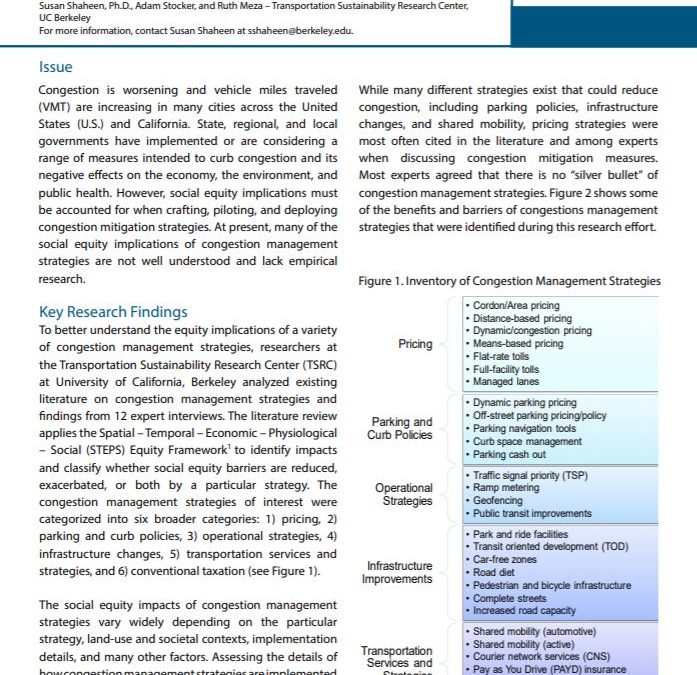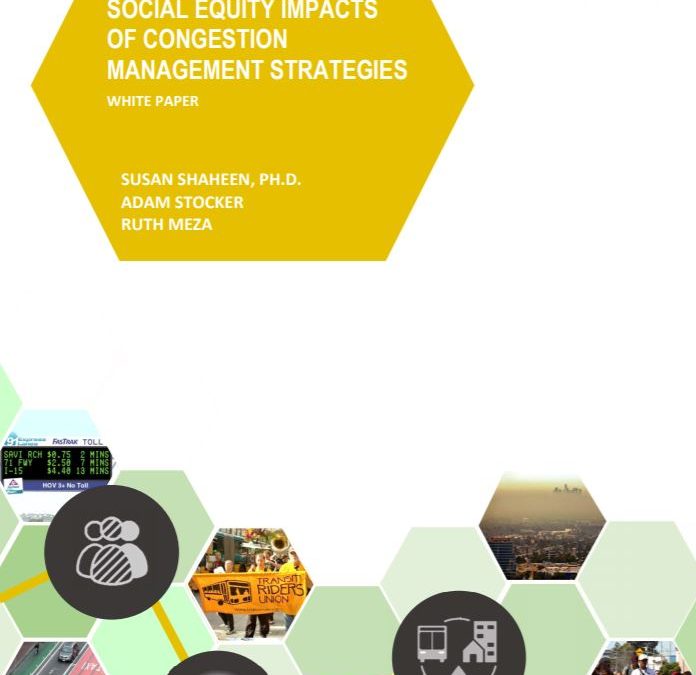by Innovative Mobility Research | Jan 24, 2023 |
Authors: Jessica Lazarus, Jacquelyn Broader, Adam Cohen, Alexandre Bayen, Susan Shaheen Date: December 2022 Abstract: California is currently exploring a mileage-based road user charge (RUC) program as an alternative to the existing gas tax. This research explores the potential social equity implications of this change through a literature review, expert interviews (N=21), general population survey (N = 3,489; final N = 3,061), and discrete choice model. The literature review and expert interviews reveal that populations that may face equity concerns include women, rural residents, un- and under-banked households, and low-income individuals. However, various strategies and program design considerations exist to attempt to address these equity concerns. The survey identified regional travel patterns across Northern, Central, and Southern California including in total vehicle miles traveled (VMT), VMT by population density, person miles traveled (PMT), trip purposes, and mode. Additionally, the survey showed travel behavior differences by age and household structure, income level, and across employment sectors. Emerging travel behavior trends include work from home rates that vary by geography, age, and employment sector and increasing delivery service use, particularly by higher-income households in select geographies. However, delivery services also may assist in addressing resource access (e.g., for zero-vehicle households). Vehicle ownership rates and the distribution of vehicle fuel type, fuel efficiency, and VMT/taxable fuel consumption also vary across geographic and demographic conditions. Less than half of the survey respondents understand how transportation is funded, roughly half factor in travel costs when making transportation decisions, and about 30% are comfortable with sharing location information to public and private entities. The discrete choice model showed a strong preference for personal auto use,...

by Innovative Mobility Research | Jan 2, 2020 |
Authors: Susan Shaheen, PhD, Adam Stocker, and Ruth Meza Date: December 2019 Abstract: To better understand the equity implications of a variety of congestion management strategies, researchers at the Transportation Sustainability Research Center (TSRC) at University of California, Berkeley analyzed existing literature on congestion management strategies and findings from 12 expert interviews. The literature review applies the Spatial – Temporal – Economic – Physiological – Social (STEPS) Equity Framework to identify impacts and classify whether social equity barriers are reduced, exacerbated, or both by a particular strategy. The congestion management strategies of interest were categorized into six broader categories: 1) pricing, 2) parking and curb policies, 3) operational strategies, 4) infrastructure changes, 5) transportation services and strategies, and 6) conventional taxation. View...

by Innovative Mobility Research | Jan 2, 2020 |
Authors: Susan Shaheen, PhD, Adam Stocker, and Ruth Meza Date: December 2019 Abstract: This white paper examines the social equity impacts of various congestion management strategies. The paper includes a comprehensive list of 30 congestion management strategies and a discussion of equity implications related to each strategy. The authors analyze existing literature and incorporate findings from 12 expert interviews from academic, non-governmental organization (NGO), public, and private sector respondents to strengthen results and fill gaps in understanding. The literature review applies the Spatial – Temporal – Economic – Physiological – Social (STEPS) Equity Framework (Shaheen et al., 2017) to identify impacts and classify whether social equity barriers are reduced, exacerbated, or both by a particular congestion mitigation measure. The congestion management strategies discussed are grouped into six main categories, including: 1) pricing, 2) parking and curb policies, 3) operational strategies, 4) infrastructure changes, 5) transportation services and strategies, and 6) conventional taxation. The findings show that the social equity impacts of certain congestion management strategies are not well understood, at present, and further empirical research is needed. Congestion mitigation measures have the potential to affect travel costs, commute times, housing, and accessibility in ways that are distinctly positive or negative for different populations. For these reasons, social equity implications of congestion management strategies should be understood and mitigated for in planning and implementation of these strategies. View...


